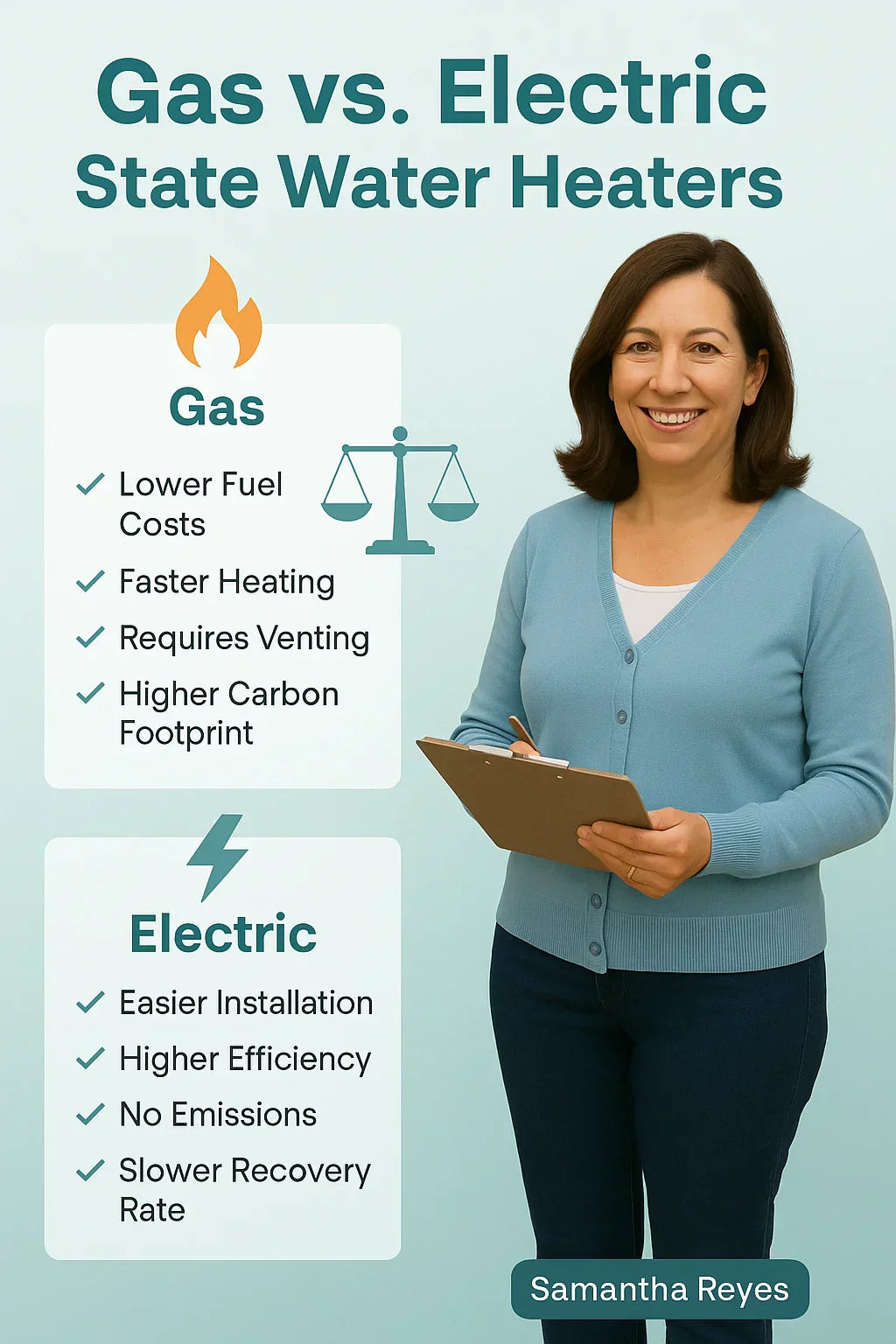Choosing between a gas or electric State water heater can significantly impact your comfort, energy bills, and long-term home efficiency. This guide will help you weigh the pros and cons to confidently select the right system for your needs.
🔥 How Gas State Water Heaters Work
Gas water heaters use natural gas or propane to heat water:
-
A burner at the bottom of the tank heats the water.
-
Hot combustion gases pass through a flue in the center, transferring heat to the water.
-
Exhaust gases are vented outside.
Benefits:
✅ Faster recovery rates.
✅ Lower operating costs in areas with low gas prices.
✅ Effective for large households with high hot water demand.
Learn more at Energy.gov - Water Heating.
⚡ How Electric State Water Heaters Work
Electric models use heating elements inside the tank to warm the water:
-
One or two elements heat the water directly.
-
Controlled by thermostats to maintain set temperatures.
-
No venting required.
Benefits:
✅ Easier installation with lower upfront installation costs.
✅ Safer, with no combustion or gas leaks.
✅ Higher efficiency with less standby heat loss.
✅ Ideal for smaller households with moderate hot water needs.
💰 Upfront Cost Comparison
| Type | Unit Cost | Installation Cost | Total Installed Cost |
|---|---|---|---|
| Gas | $600 - $1,000 | $500 - $1,000 | $1,100 - $2,000 |
| Electric | $500 - $900 | $400 - $900 | $900 - $1,800 |
Note: Gas installations may require venting systems and gas line upgrades, while electric models may need electrical breaker checks.
🏠 Operating Cost Comparison
Gas:
-
Often cheaper to operate in areas with low gas prices.
-
Faster recovery reduces wait times for hot water.
Electric:
-
Higher operational costs if local electricity rates are high.
-
Lower standby heat loss, improving efficiency.
-
Better suited for regions where electricity rates are competitive.
Check your local utility rates to estimate which option offers better long-term savings.
🌱 Energy Efficiency and Environmental Impact
-
Gas models produce greenhouse gas emissions during operation.
-
Electric models can be powered by renewable energy if your provider offers it.
-
Electric units generally have higher Energy Factor (EF) ratings, reflecting efficiency.
Explore rebates and tax credits for Energy Star-qualified State models
🚿 Hot Water Recovery Rates and Performance
Gas:
✅ Recovers hot water faster (30-50 gallons per hour).
✅ Better for large families or homes with simultaneous hot water use.
Electric:
✅ Slower recovery rates (12-25 gallons per hour).
✅ Suitable for smaller households or homes with staggered hot water use.
For families using multiple showers, laundry, and dishwashers at the same time, gas may be more practical.
🧰 Maintenance Considerations
Gas:
-
Annual vent and burner inspection.
-
Pilot light and thermocouple checks.
-
Flushing tank to remove sediment.
Electric:
-
Flushing the tank annually.
-
Checking heating elements and thermostat accuracy.
-
No venting or combustion maintenance required.
For maintenance guidance, visit State Water Heaters Maintenance Resources.
🪙 Rebates, Tax Credits, and Long-Term Savings
Both gas and electric State models may qualify for: ✅ Federal tax credits for high-efficiency models.
✅ State and local rebates for Energy Star units.
✅ Utility incentives to reduce upfront costs.
Check your eligibility on Energy Star and DSIRE.
✅ Conclusion: Which Should You Choose?
Choose Gas If:
✅ Your home has existing gas lines and venting.
✅ You have a large family with high hot water demands.
✅ Natural gas rates are lower in your region.
Choose Electric If:
✅ You want a simpler installation with lower upfront costs.
✅ Your household has moderate hot water needs.
✅ You prefer a safer, vent-free system.
✅ You plan to use renewable electricity.
📝 Next Steps:
1️⃣ Assess your household's hot water usage patterns.
2️⃣ Check your local gas and electricity rates.
3️⃣ Measure your installation space for venting or breaker needs.
4️⃣ Explore State models on The Furnace Outlet.
5️⃣ Consult with a licensed plumber or HVAC professional to confirm your choice.
Choosing between gas and electric State water heaters ensures your home remains comfortable while managing energy bills and maximizing efficiency for years to come.
In the next topic we will read more about: Do State Water Heaters Qualify for Energy Star and Rebates?







